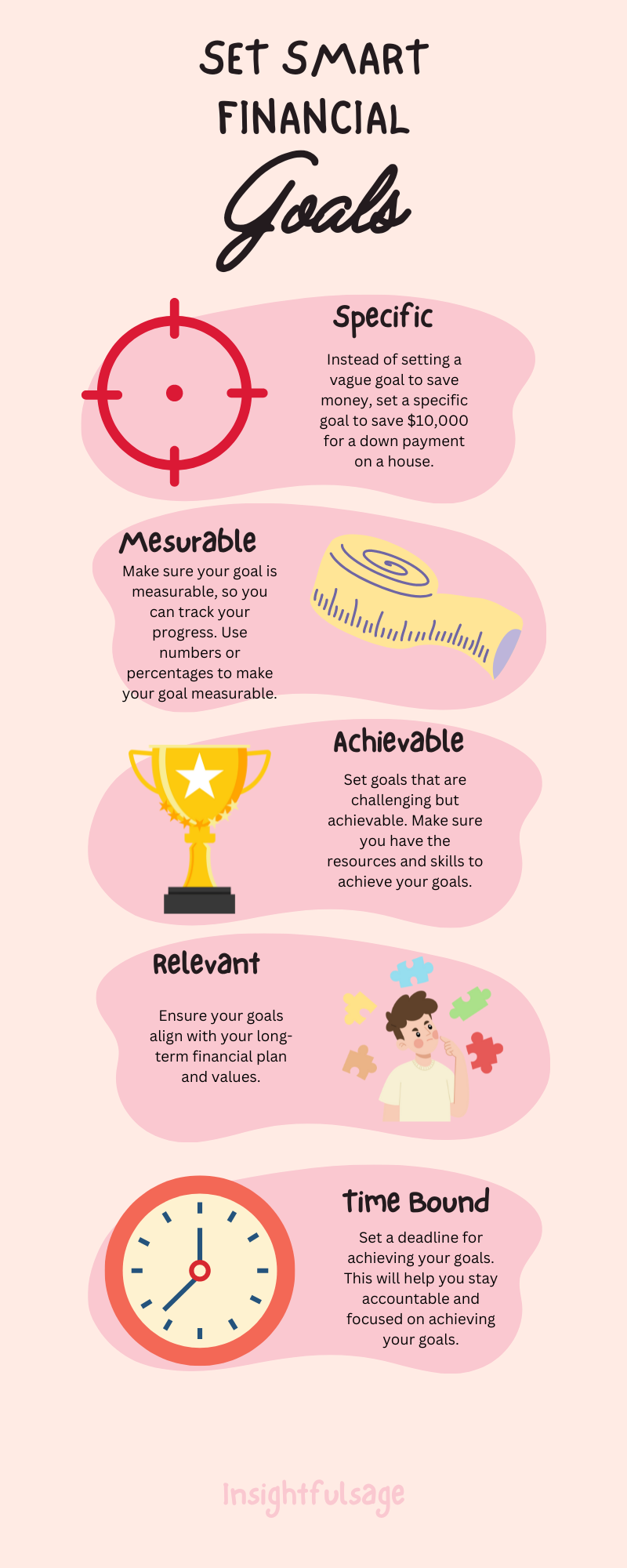Financial planning is an essential aspect of managing your finances effectively. It involves creating a roadmap for your financial goals, determining your current financial situation, and identifying the steps you need to take to achieve your goals. Without proper financial planning, it’s easy to get lost and end up in debt or financial distress.
However, financial planning is not just about numbers and figures. The right mindset is equally important in achieving financial success. Your attitude towards money, your beliefs about wealth, and your overall financial mindset can have a significant impact on your financial decisions and actions.
A positive financial mindset can help you stay motivated, disciplined, and focused on your goals. It can also help you overcome any challenges that come your way and make better financial decisions. On the other hand, a negative financial mindset can lead to self-sabotage, procrastination, and a lack of motivation, which can hinder your financial progress.
Therefore, mastering the art of financial planning requires not only the right knowledge and skills, but also the right mindset. In this post, we’ll explore the importance of a positive financial mindset and provide practical tips to help you maintain it.
Setting Financial Goals
Setting financial goals is crucial for achieving financial success. Without clear goals, it’s challenging to know where to focus your time and energy, and you risk losing sight of what you want to achieve. Here are some reasons why setting financial goals is important:
Provides direction and focus
Setting financial goals gives you a clear direction and focus, helping you prioritize your time and resources.
Motivates and encourages progress
When you have clear financial goals, you’re more likely to stay motivated and committed to achieving them.
Measures progress
Setting financial goals allows you to track your progress and celebrate your achievements along the way.

To set effective financial goals, you can use the SMART criteria, which stands for Specific, Measurable, Achievable, Relevant, and Time-bound. Here’s how you can apply the SMART criteria to your financial goals:
Specific
Be specific about what you want to achieve. For example, instead of setting a vague goal to save money, set a specific goal to save $10,000 for a down payment on a house.
Measurable
Make sure your goal is measurable, so you can track your progress. Use numbers or percentages to make your goal measurable.
Achievable
Set goals that are challenging but achievable. Make sure you have the resources and skills to achieve your goals.
Relevant
Ensure your goals align with your long-term financial plan and values.
Time-bound
Set a deadline for achieving your goals. This will help you stay accountable and focused on achieving your goals.
Once you’ve set your financial goals, prioritize them based on their importance and urgency. This will help you stay focused and avoid becoming overwhelmed.
Budgeting and Saving
Creating and following a budget is essential for achieving financial stability and reaching your financial goals. A budget is a financial plan that outlines your income and expenses over a specific period. It helps you keep track of your spending, avoid overspending, and save money. Here’s why creating a budget is important:
Helps you manage your money
A budget helps you manage your money by tracking your income and expenses.
Helps you save money
A budget can help you identify areas where you can cut back on expenses, allowing you to save more money.
Helps you plan for the future
A budget can help you plan for long-term goals, such as buying a house, starting a business, or saving for retirement.
To create a realistic budget, start by tracking your income and expenses for a few months. This will help you identify your spending patterns and determine how much money you can allocate to different expenses. Here are some tips for creating a realistic budget:
Set realistic goals
Set goals that are achievable, considering your income and expenses.
Prioritize your expenses
Prioritize your expenses based on their importance and urgency.
Cut back on unnecessary expenses
Identify areas where you can cut back on expenses, such as dining out, entertainment, or subscriptions.
Use budgeting tools
Use budgeting tools, such as budgeting apps, to help you track your expenses and stay on top of your budget.
To save money and reduce expenses, consider strategies such as buying generic brands, shopping for sales, and negotiating bills. With a realistic budget and some smart saving strategies, you can achieve your financial goals and improve your financial wellbeing.
Managing Debt
Managing debt is an essential part of financial planning. Debt can quickly become overwhelming and can prevent you from achieving your financial goals. Understanding the different types of debt and prioritizing debt repayment can help you manage your debt and improve your financial wellbeing. Here are some things to keep in mind:
Different types of debt
There are various types of debt, such as credit card debt, student loans, car loans, and mortgages. Each type of debt has different interest rates and repayment terms.
Prioritizing debt repayment
Start by prioritizing debt with the highest interest rate, as it’s costing you the most money. You can also consider prioritizing debts with smaller balances, as paying them off can give you a sense of accomplishment and motivation to tackle larger debts.
Strategies for paying off debt faster
There are several strategies you can use to pay off debt faster, such as the debt snowball method or the debt avalanche method. With the debt snowball method, you pay off debts with smaller balances first, while with the debt avalanche method, you pay off debts with the highest interest rates first.
Other strategies for paying off debt faster include consolidating your debt with a personal loan or balance transfer credit card, negotiating with creditors for lower interest rates, and increasing your income through a side hustle or asking for a raise.
Remember, managing debt is a marathon, not a sprint. It takes time and discipline, but with the right mindset and strategies, you can become debt-free and achieve financial freedom.
Investing for the Future
Investing is an essential part of financial planning, helping you build wealth and achieve your long-term financial goals. Investing involves putting your money into various assets, such as stocks, bonds, real estate, and mutual funds, with the expectation of earning a return on your investment. Here’s why investing is important:
Helps you grow your wealth
Investing allows you to earn a return on your money, helping you grow your wealth over time.
Helps you achieve your financial goals
Investing can help you achieve long-term financial goals, such as saving for retirement or buying a house.
Helps you beat inflation
Investing can help you beat inflation, which erodes the value of your money over time.
When it comes to investing, there are various types of investments to choose from, each with its own risk and return profile. These include stocks, bonds, real estate, and mutual funds. To create an investment portfolio, start by determining your risk tolerance, investment goals, and time horizon. Then, choose a mix of investments that align with your goals and risk tolerance.
To minimize investment risk, consider strategies such as diversification, asset allocation, and dollar-cost averaging.
Diversification
Diversification involves investing in a mix of different asset classes to spread out risk.
Asset Allocation
Asset allocation involves dividing your investment portfolio among different asset classes based on your risk tolerance and investment goals.
Dollar Cost Averaging
Dollar-cost averaging involves investing a fixed amount of money at regular intervals, regardless of the market conditions, to minimize the impact of market volatility on your investment returns.
Investing can be complex, and it’s essential to do your research and seek professional advice if needed. With the right mindset and strategies, you can build a successful investment portfolio and achieve your financial goals.
Protecting Your Assets
Asset protection is an essential part of financial planning, helping you safeguard your wealth and protect yourself from financial risks. There are various ways to protect your assets, including insurance. Here’s why asset protection is important and how to choose the right insurance policies for your needs:
Why asset protection is important
Asset protection helps you protect your wealth and financial well-being from unexpected events, such as accidents, illness, or lawsuits.
Different types of insurance
There are various types of insurance policies to choose from, including health insurance, life insurance, disability insurance, long-term care insurance, and liability insurance.
How to choose the right insurance policies for your needs
Start by assessing your risks and financial goals. For example, if you have dependents who rely on your income, you may need life insurance to provide financial support in case of your unexpected death. If you have significant assets or a high net worth, you may need liability insurance to protect yourself from lawsuits.
When choosing insurance policies, consider the coverage, premiums, deductibles, and exclusions. Make sure you understand the terms and conditions of the policy and shop around to compare quotes from different providers. It’s also essential to review your insurance coverage regularly and make adjustments as needed based on changes in your circumstances.
By protecting your assets with the right insurance policies, you can have peace of mind knowing that you’re prepared for unexpected events and have a safety net in place to protect your financial well-being.
Conclusion
In conclusion, financial planning is crucial for achieving your long-term financial goals and building a secure financial future. While it involves practical steps like setting financial goals, creating a budget, managing debt, investing, and protecting your assets, having the right mindset is equally important. Here’s why:
The importance of a mindset shift in financial planning
A positive mindset can help you stay motivated, make better financial decisions, and overcome challenges along the way. By adopting a growth mindset and focusing on progress rather than perfection, you can approach financial planning with confidence and resilience.
Tips for maintaining a positive financial mindset
To maintain a positive financial mindset, focus on your financial goals and celebrate your progress along the way. Surround yourself with supportive people who share your values and beliefs about money. Avoid comparing yourself to others and focus on your own journey. Finally, be kind to yourself and acknowledge that setbacks and mistakes are part of the learning process.
By adopting a positive mindset and implementing practical financial planning strategies, you can build a secure financial future and achieve your long-term financial goals. Remember that financial planning is a journey, and with the right mindset and strategies, you can overcome challenges, stay motivated, and achieve financial success.





